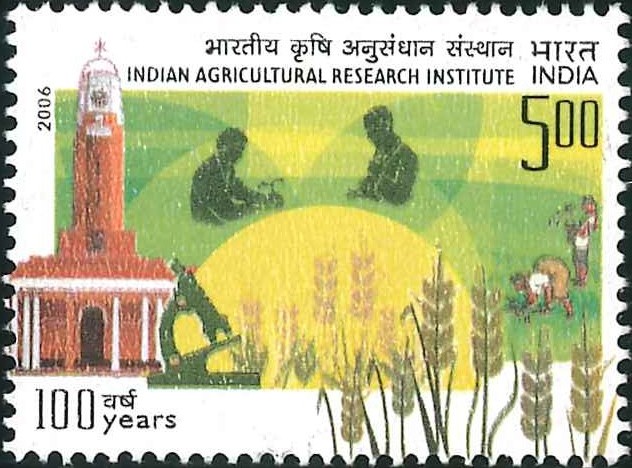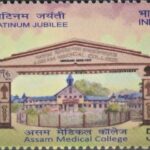
ICRISAT
A commemorative postage stamp on the 50th Anniversary of International Crops Research Institute for the Semi-Arid Tropics, Hyderabad :
 Issued by India
Issued by India
Issued on Feb 5, 2022
Issued for : Department of Posts is pleased to issue Commemorative Postage Stamp on 50 years of International Crops Research Institute for the Semi-Arid Tropics (ICRISAT) and appreciate its efforts to reduce poverty, hunger, malnutrition and environmental degradation in the drylands.
Credits :
Stamp/FDC/Brochure : Shri Brahm Prakash
Type : Stamp, Mint Condition
Colour : Multi Colour
Denomination : 500 Paise
Stamps Printed : 309500
Printing Process : Wet Offset
Printer : Security Printing Press, Hyderabad
About :
- The International Crops Research Institute for the Semi-Arid Tropics (ICRISAT) was established on 28 March 1972 with the signing of a memorandum between the Government of India and Ford Foundation. ICRISAT aims a prosperous, food-secure and resilient drylands in Asia & Africa and to reduce poverty, hunger, malnutrition and environmental degradation in the drylands.
- The drylands cover about 6.5 million sq. km. in over 55 countries with a population of over 2 billion. ICRISAT’s geographic focus is on the drylands of Africa and Asia and its mandate is research on crops which specifically grow in the drylands such as millets, sorghum, chickpea, pigeonpea and groundnut. These crops are the most resilient, highly nutritious and climate smart. With the vision of a prosperous, food-secure and resilient dryland tropics ICRISAT works with millions of smallholder farmers across Asia and sub-Saharan Africa. ICRISAT’s mission to reduce poverty, hunger, malnutrition and environmental degradation in the drylands is facilitated by its work ranging from high-end genomics and molecular breeding to working directly with farmers introducing new varieties, hybrids and farming technologies. ICRISAT works in a holistic manner across the entire value chain with a special emphasis on women and youth. Gender-sensitive agriculture and nutrition-sensitive agriculture are the foundation of ICRISAT’s work. Its work contributes to Sustainable Development Goals SDG1, SDG2, SDG3, SDG5.b and SDG13.1.
- ICRISAT’s core strength of world-class research ranging from genebank, genomics, gene editing, modern crop breeding, natural resource management, seed systems, and climate-smart agriculture to agribusiness models, digital solutions and policy inputs is at the service of smallholder farmers across the dryland regions of the world.
- ICRISAT values its partnership with the Government of India, the Ministry of Agriculture and Farmers Welfare, the Indian Council of Agricultural Research and its affiliated research institutes, various state agriculture universities, state government agriculture departments and other stakeholders in the Indian agriculture ecosystem. This collaboration has helped benefit smallholder farmers not only in India but also in sub-Saharan Africa as the technologies developed here also benefit farmers in Africa. ICRISAT’s work in India is closely aligned to the national priorities and to do so it has leveraged global expertise and partnerships, used leading-edge innovative ideas, concepts and tools and our understanding of the needs on the ground based on our five decades of experience.
- ICRISAT works with diverse public, private and international research partnerships across Asia and Africa. This makes a difference in farmers’ fields by scaling scientific innovations with due cognizance and support of the policy, market and socio-economic environment. ICRISAT works with national partners to increase crop productivity and incomes of farmers in the drylands while improving the resilience of the lands and livelihoods of resource-poor communities.
- The food systems of the drylands have a critical role in feeding the growing world population. Agriculture can be the engine of rural prosperity and a vision for dryland agriculture that can meet both human needs and planetary boundaries is “to transform dryland agriculture from its current subsistence level to a profitable enterprise”. The dryland food systems of the future must be sustainable, resilient, inclusive and nutrition-sensitive.
- Text : Referenced from contents provided by ICRISAT.
Subscribe
Login
0 Comments







